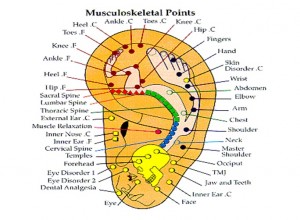Complementary therapies for people with MS
Oxygen • Massage • Manual Therapy - Osteopathic Technique • Physiotherapy • Acupuncture • Foot Health • Reflexology • Gymnasium
Complementary therapies can be invaluable in helping those with MS manage their condition. There is no cure, but each of the therapies on offer at the centre is known to help relieve the symptoms of MS in some way.
All our therapies are provided by fully qualified professionals.
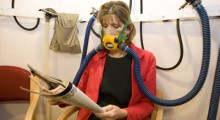
Oxygen
Oxygen Treatment under pressure is a simple, non-invasive and painless therapy that has been used to treat the symptoms of MS and other conditions for many years.
The aim of Oxygen Treatment in MS is to minimise the amount of damage being caused, promote rapid healing and limit scar formation, which can prevent nerve function being restored. The most reported benefits are improved balance, sensory perception and control of incontinence. Some gain relief from symptoms.
Oxygen Treatment involves breathing pure oxygen in a chamber at 1.5 to 2 times normal atmospheric pressure. The chamber at the Centre can accommodate 6 people.
Read more about Oxygen Treatment for MS here.
Read more about Oxygen Treatment for other conditions.
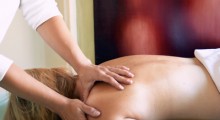
Massage
Massage Therapy aims to provide people with time and space for a relaxing and soothing experience in a warm, supportive atmosphere. Massage improves the circulation. It relaxes tense muscles and is an excellent way to unwind and help restore a sense of well being and balance.

Helen Thorpe IHBC, CIBTAC, CIDESCO, BABTAC Member. Helen qualified as a beauty therapist in the summer of 1986. She received “Student of the Year” at the end of her course in Birmingham.
She has now been teaching to an International standard for the past 17 years, the job role also includes examining students to a high level.
Helen has spent many years working with clients with multiple sclerosis, tailoring treatments to their individual needs. Most clients benefit from deep tissue massage for increased circulation and muscular tension. This treatment has been the most popular with her clients.
Reflexology is a holistic treatment on the feet for well being and relaxation. This treatment can complement massage or be an alternative option.
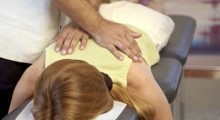
Manual Therapy - Osteopathic Technique
Osteopathy is an established, recognised system of diagnosis and treatment that lays its main emphasis on the structural integrity of the body. Osteopathy cannot address neurological problems directly associated with MS. It does, however, deal with those issues related to having MS.
Postural issues that put repeated pressure on arms and shoulders, problems with walking and gait, wheelchair use, stick use; all these are problems of muscle, joint and connective tissue that can be helped with osteopathic treatment. Falls are common and distressing. Osteopathy can help with the resolution of injury from falls.
Other aspects of life that MS sufferers have that are common to the population as a whole include stressed out shoulders and the associated headaches, so-called ‘tennis elbow’, housemaids knee – all conditions that osteopathy can help with.

Manual Therapist trained in Osteopathic Technique.
Trained in massage in 1996, qualified as an osteopath in 2004. Semi retired in 2018 so now still practising with all his years of experience. Specialised in MS and postural issues from a structural perspective.
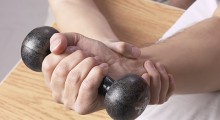
Physiotherapy
Physiotherapy can help MS patients in various ways: teaching how to control and co-ordinate movement patterns; reducing spasticity and encouraging more normal movements; helping to regain functional abilities.
Physio programmes at the Centre are tailored to the individual needs of each person. By careful and detailed assessment the physiotherapist can draw up a regime specific to each patient.
MS patients can be shown how to help themselves regain movement and co-ordination. By monitoring their own progress, patients can use the gains made through treatment to broaden the activities they need for daily living.

Tricia qualified from Glasgow Queens College in 1990. After qualifying she worked in Cardiff as a junior physiotherapist, then moved to Swansea for a more senior post. During this time Tricia gained a broad spectrum of experience, working in a variety of clinical settings – outpatients, orthopaedics, elderly, rehabilitation, neurosurgery and neurology.
Tricia then moved to Oxford to specialise in neurology. From there she worked in Reading as a senior physiotherapist in medical wards and a stroke unit, until she had her children.
Tricia has a very broad spectrum of physiotherapy experience, which allows her to assess and plan appropriate treatment programmes specific to each individual.
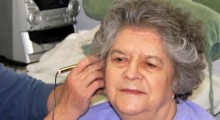
Acupuncture
Acupuncture involves the insertion of small needles into parts of the body. It can can promote a feeling of well-being and help with pain relief and other issues such as bladder control, shaking and fatigue. Acupuncture is non addictive and has no side effects.
Our therapist offers a variety of acupunture techniques including: Auricular, Korean Hand, Cosmetic, Facial Cupping & Gua Sha.
The Eastern view is that we all have Chi (life energy) flowing through meridians (channels); these meridians extend throughout the body. When we have an ache or pain, the flow of Chi is blocked. By stimulating certain points corresponding to the part of the body which is troubling, the chi is cleared allowing it to flow naturally again and the body’s own natural repair system to take over.
Auricular Acupuncture is a complementary therapy where small needles are inserted into points on the outer ear. The outer ear mirrors in shape an upside down foetus, with the earlobe being the head. There are corresponding points for the whole body, including internal organs, distributed over the ear:

Tim trained in Auricular Acupuncture (Microsystems Acupuncture) for alcohol and substance addiction and for pain and musculoskeletal conditions, cosmetic acupuncture, Gua Sha and facial cupping at the College of Chinese Medicine in London. He has been practising in and around the Oxford area for over 7 years.
Tim is a member of the Acupuncture Society, abides by their code of ethics and is fully insured and licensed to practice Acupuncture.
Tim is also a member of the Complementary and Natural Healthcare Council (CNHC) whose key purpose is to protect the public. The Department of Health recommend you consult with a CNHC registered practitioner.
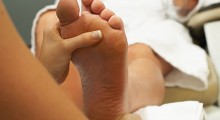
Foot Health
Routine foot care, helping people to care for their feet, relieving pain and treating a variety of conditions.
Assessing foot conditions and treating them appropriately. A wide variety of foot problems such as corns and calluses verrucae, thickened nails and fungal infections, providing advice on how to maintain optimal foot health.

Janet qualified with the SMAE Institute in Maidenhead and is a member of the Open College of Foot Health Professionals (MCFHP) and a member of the British Association of Foot Health Professionals (MAFHP).
She is bound by the Code of Ethics and Rules of the Association, has a clear CRB record (particularly for working with children and vulnerable adults) and holds all the appropriate insurances.
She strives to provide a highly professional service where your comfort, safety, hygiene and confidentiality are paramount and regularly updates her knowledge through continued professional development courses at the SMAE Institute.
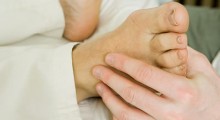
Reflexology
Reflexology is a popular complementary therapy. It may promote relaxation, improve circulation, reduce pain, soothe tired feet, and encourage overall well-being.
The underlying theory behind reflexology is that there are “reflex” areas on the feet and hands that correspond to specific organs, glands, and other parts of the body. Practitioners believe that applying pressure to these reflex areas can promote health in the corresponding organs through energetic pathways. view foot map
Many people feel calm and relaxed after a treatment. They may even feel sleepy.

Helen Thorpe IHBC, CIBTAC, CIDESCO, BABTAC Member. Helen qualified as a beauty therapist in the summer of 1986. She received “Student of the Year” at the end of her course in Birmingham.
She has now been teaching to an International standard for the past 17 years, the job role also includes examining students to a high level.
Helen has spent many years working with clients with multiple sclerosis, tailoring treatments to their individual needs. Most clients benefit from deep tissue massage for increased circulation and muscular tension. This treatment has been the most popular with her clients.
Reflexology is a holistic treatment on the feet for well being and relaxation. This treatment can complement massage or be an alternative option.
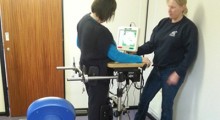
Gymnasium
Our new gym includes both MOTOMED and THERA Trainer which provide leg and arm/upper body training, and a Balance Trainer enabling those with very limited balance to stand safely. Also available in the gym are Parallel bars, Wall fixed bars, Theraband, Gym balls and Exercise mat.
Everybody is different: different treatments work for different people. We strongly believe it’s all about finding what works for you as an individual.
Get in touch to find out more, or to speak to a therapy practitioner.




